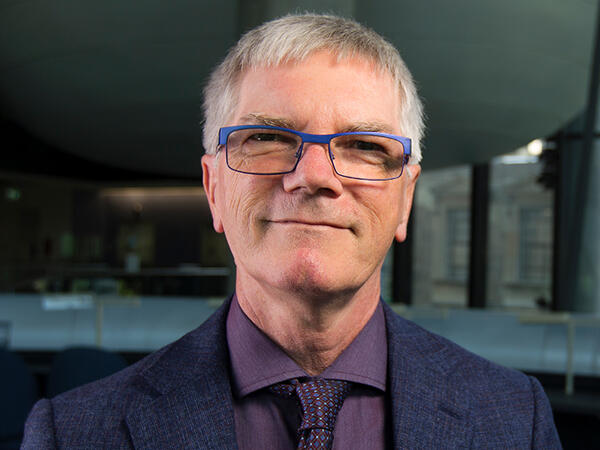
Raymond
Reilly
144 College Street
Toronto ON M5S 3M2
Canada
Area of Research
Raymond Reilly’s research focuses on developing novel radiopharmaceutical agents to detect and treat cancer. His work involves discovery, preclinical development and clinical translation of these agents for molecular imaging or molecularly targeted radiotherapy of cancer.
Research Challenge
Cancer is often challenging to treat, in part because each tumour is different. Tumours can vary in the genes that they express, the proteins that are displayed, and how they respond to treatments. To study a tumour’s molecular properties, oncologists are investigating an approach called molecular imaging, which can probe these tumour properties.
One approach to molecular imaging of cancer, used in nuclear medicine, involves a probe molecule tagged with a radioactive isotope that can be detected by imaging using either single-photon emission computed tomography (SPECT) or positron emission tomography (PET). To specifically image the properties of cancer cells, scientists can attach the radioactive isotope to a targeting agent that is capable of binding to the proteins displayed by the cancer cells. These compounds are called radiopharmaceuticals and can be used to detect and characterize the properties of tumours with very high sensitivity and specificity.
Proposed Solution
Prof. Reilly’s research group develops and studies the use of novel radiopharmaceutical probes that target proteins overexpressed on tumour cells to aid in cancer diagnosis, imaging and treatment. The use of radiopharmaceuticals for cancer treatment is called targeted radiotherapy, and it pairs tumour-targeting agents with radioisotopes that emit damaging forms of radiation that can kill tumour cells. Targeting of this radiation to tumours minimizes the effect on healthy cells.
Prof. Reilly’s group investigates monoclonal antibodies labeled with radioisotopes for imaging and treatment of cancer, and is also studying the use of radiolabelled gold nanoparticles for locally treating tumours with radiation. In one unique approach, the antibodies or nanoparticles are designed to enter tumour cells and deliver a short range radiation called Auger electrons inside the cell rather than from the outside, reducing the toxicity to nearby healthy tissues.
Prof. Reilly’s group aims to translate their most successful imaging and radiotherapeutic agents to clinical trials. They evaluate the agents preclinically using animal tumour models and develop pharmaceutical quality formulations of the agents that are ready to test in phase I clinical trials.
Impact To Date
Prof. Reilly has developed radiopharmaceutical probes for breast cancer that are capable of imaging tumours and monitoring the tumour’s response to therapy. His group has also developed radiotherapeutic agents capable of stopping pancreatic and breast cancer tumour growth in mice without toxicity to healthy tissues. The use of targeted radiotherapeutic agents may overcome the resistance of tumours to existing anti-cancer drugs. One of these radiopharmaceutical agents is currently being advanced to a Phase 1 clinical trial.
Radiopharmaceuticals have the potential to enhance cancer diagnosis and help oncologists select personalized treatments based on the molecular characteristics of an individual’s tumour. Particularly attractive is that the same agents used to diagnose a tumour often may be extended directly to treatment, in what is known as a “theranostic” strategy.
Awards and Accomplishments
- Editor of Medical Imaging for Health Professionals: Technologies and Clinical Applications (2019)
- Editor of Monoclonal Antibody and Peptide-Targeted Radiotherapy of Cancer (2010) which won 1st prize in the oncology category of the British Medical Association’s Medical Book Awards
Publications
Keywords: breast cancer, radioimmunotherapy, auger electron, SPECT, PET, glioblastoma, blood-brain barrier, cancer, pancreatic cancer, head cancer, neck cancer, metastases, nanomedicines, radiation nanomedicine, radiation, translational research, molecular imaging, CPO, oncology


